Find Out What Is The Most Popular Voice Synthesizer
Voice synthesizers have become an integral part of our digital experiences, transforming text into natural-sounding speech. With advancements in artificial intelligence (AI) technology, the market is flooded with various voice synthesizer options.
In this article, we will delve into the world of AI text to speech synthesizers and present a comprehensive list of the most popular choices available in 2023.
Whether you are looking for personal or professional use, these top-notch voice synthesizers will surely meet your needs.
Part 1. What is a Voice Synthesizer?

A voice synthesizer, also known as a text to speech (TTS) synthesizer, is an AI-powered software or hardware device that converts written text into spoken words.
It uses sophisticated algorithms and linguistic rules to generate lifelike human voices from the inputted text. By analyzing patterns and phonetics of language, voice synthesizers can mimic natural intonation, rhythm, and pronunciation.
Part 2. How Does Voice Synthesizer Work?
Voice synthesizers utilize complex algorithms and linguistic rules to convert written text into spoken words. The process involves several steps that work together seamlessly to generate natural-sounding speech.
Here is a simplified explanation of how voice synthesizers typically work:
- 1. Text Analysis: The inputted text is analyzed to understand its linguistic structure, grammar, punctuation, and context.
- 2. Linguistic Processing: The voice synthesizer applies linguistic rules and algorithms to determine the appropriate pronunciation, intonation, and rhythm for each word or sentence in the text.
- 3. Phoneme Generation: Phonemes are individual units of sound in language. The voice synthesizer identifies the phonemes required for each word based on its linguistic analysis.
- 4. Acoustic Modeling: By using pre-recorded human speech samples, machine learning techniques are employed to map acoustic characteristics (e.g., pitch, intensity) with corresponding phonetic information.
- 5. Voice Synthesis: Using the determined phonemes and their acoustic properties, the voice synthesizer combines them together to create synthesized speech output.
- 6. Post-processing: Additional processing may be applied to enhance or modify the synthesized voice's attributes, such as pitch modulation or adding emotions like happiness or sadness.
- 7. Output Generation: The synthesized speech is transformed into an audio file format (such as WAV or MP3), ready for playback through speakers or other audio devices.
Part 3. Top 7 Text To Speech Synthesizers
Here are seven of the top AI text-to-speech synthesizers available in 2023, along with some key features and their pros and cons:
1. Best Text To Speech Synthesizer - HitPaw Edimakor
If you're looking for a high-quality text-to-speech solution that works equally well on PC and Mac, go no further than HitPaw Edimakor.
In addition to its excellent text-to-speech functionality, this program also includes a full set of tools to improve your video editing. The software's intuitive layout makes it suitable for first-time users.
Follow these steps to edit videos using HitPaw Edimakor:
Step 1: Get HitPaw Edimakor from their website and run it on your computer.
Step 2: The "Import" button and drag-and-drop support make it simple to add videos.

Step 3: Arrange video clips sequentially on a timeline.
Step 4: Use video-modifying features, including trimming, splitting, combining, cropping, and resizing.

Step 5: Before saving the changes, you may see a live preview of them. The edited videos can be saved or exported directly to the device.
Pros
- AI-powered text-to-sound enhances the potential for creativity.
- Extra video editing options allow for comprehensive editing.
- User-friendly UI makes navigating easy for all levels.
- Edit videos by including music, text, and stickers.
- Speech synthesis from text is a new function coming soon.
Cons
- The text-to-speech feature will come out within the next released version.
2. Speechify
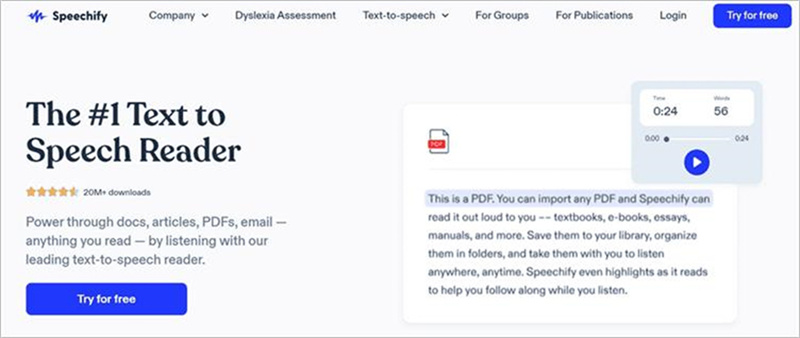
Speechify is a powerful text-to-speech tool that offers seamless conversion of various text formats into realistic audio.
With its versatility and user-friendly interface, it simplifies the process of transforming PDFs, emails, documents, and articles into easily understandable spoken content.
Pros
- Supports a wide range of formats for converting textual content.
- Allows users to customize reading speed for a personalized listening experience.
- Offers over 30 natural-sounding voices to choose from.
- Capable of accurately recognizing and processing more than 15 different languages for precise pronunciation.
Cons
- Limited to be a web-based platform, requiring an internet connection for access.
3. Murf.ai

Murf, a widely acclaimed AI voice generator, has gained popularity among professionals across diverse fields for its exceptional ability to convert text into incredibly lifelike speech.
Pros
- Offers a vast array of voices and dialects to choose from.
- Includes a built-in video editor for effortless creation of voiceovers.
- Boasts an extensive library of AI voices in multiple languages.
- Provides a voice changer feature for recording versatile voiceovers.
Cons
- Advanced features come with a paid subscription model.
4. NaturalReader
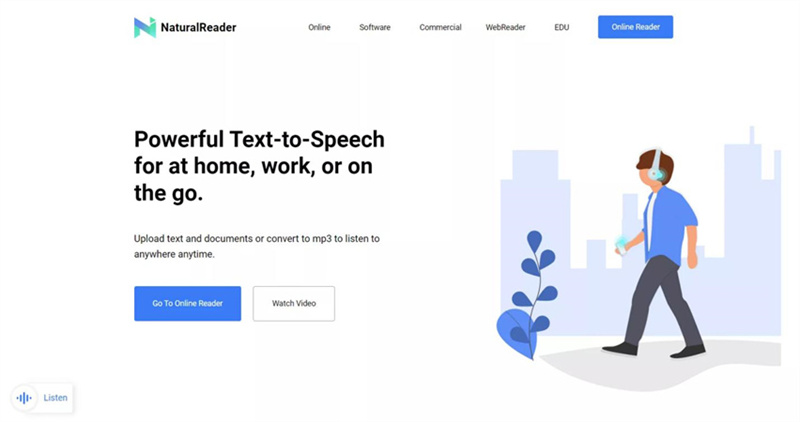
Natural Reader is a highly regarded free text-to-speech tool that stands out from the rest due to its impressive range of features. Its user-friendly interface and support for multiple file formats make it a convenient choice for users aiming to convert written content into audio format.
Pros
- Natural Reader provides its powerful set of features at no cost.
- Users can work with various document types, enhancing usability and compatibility.
- The tool converts text from images or scans into precise audio output.
Cons
- Natural Reader may have fewer options for adjusting and customizing the voice, pitch, or speed.
5. Text to Speech Online
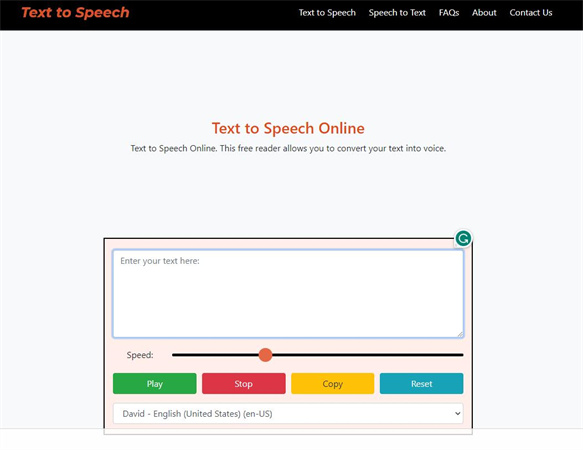
Text to Speech Online is a user-friendly tool that enables you to effortlessly convert your written text into spoken words.
Whether you need an audio version of an article, document, or any other text material, this online reader offers a straightforward solution without any cost or subscription requirements.
Pros
- High-quality audio clarity ensures easy recognition and understanding of the speech.
- Provides natural human voice output with options to choose voice gender or accent.
- Swift conversion process, delivering near-instant results.
- User-friendly interface with simple buttons and adjustable speed option.
Cons
- No language options or multilingual support.
- Limited customization features beyond choosing voice gender or accent.
6. TTSReader

TTSReader is a powerful tool that allows users to listen to texts, webpages, PDFs, and ebooks with natural-sounding voices.
With its user-friendly interface and seamless functionality, TTSReader offers convenience and flexibility.
Pros
- Accessibility for visually impaired individuals or those with reading difficulties.
- No need to download or install; it works directly in the browser.
- Remembers text and position, allowing seamless continuation between sessions.
- Supports offline usage, making it convenient for various environments.
Cons
- Limited customization options for voice selection and speech speed adjustments.
- Certain accents or nuanced pronunciations may be lacking in naturalness.
7. Google Cloud
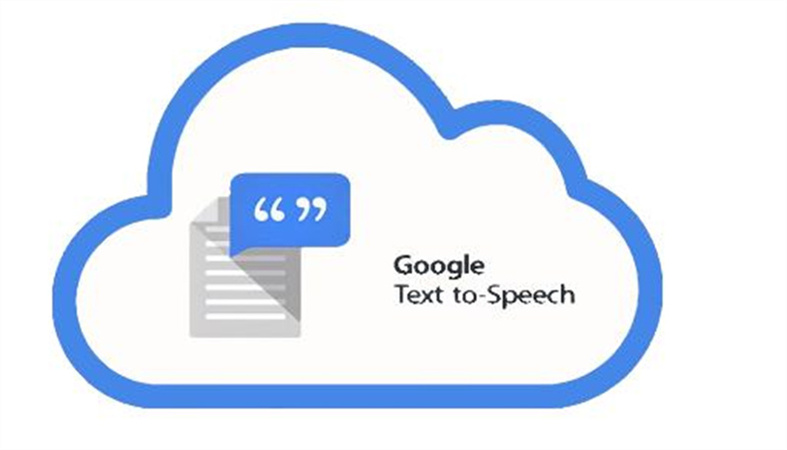
Google Cloud offers a powerful API that leverages the best of Google's AI technologies to convert text into natural-sounding speech.
With $300 in free credits for new customers, you can experience the benefits of their Text-to-Speech service firsthand.
Pros
- High-fidelity speech with humanlike intonation.
- Wide voice selection across multiple languages and variants.
- Ability to create a unique brand voice.
Cons
- Cost implications beyond initial free credits.
- Dependence on internet connectivity for API usage.
Part 4. FAQs of Voice Synthesizer
Q1. What is AI voice synthesis?
A1.
AI voice synthesis refers to the use of artificial intelligence (AI) technologies to generate natural-sounding and human-like speech from written text.
It involves the application of deep learning techniques, neural networks, machine learning algorithms, and linguistic rules to analyze and process text inputs in order to produce synthesized speech output.
Q2. How are AI generated voices made?
A2.
AI-generated voices are created through a process that involves training deep learning models on large amounts of recorded speech from human speakers.
These models, often based on neural networks like recurrent neural networks (RNNs) or convolutional neural networks (CNNs), learn to understand the patterns and nuances in human speech.
Q3. Why are AI voices always female?
A3. The initial preference for female-sounding AI voices can be attributed to various factors. One reason is that studies have shown that people tend to perceive female voices as more pleasant and trustworthy in certain contexts. Additionally, historically, females were often chosen for automated phone systems due to their higher pitch being easier to understand in low-quality audio connections.
Final Words
Voice synthesizers powered by AI technology have revolutionized the way we interact with digital content. These advanced systems have the ability to convert written text into natural-sounding speech, offering a range of applications and benefits across various industries.
In exploring this fascinating field of AI-generated voices, it's worth considering trying out HitPaw Edimakor. This innovative video editing software offers an intuitive interface coupled with powerful features that can enhance your multimedia projects. Give it a try and see how it can elevate your video editing experience today.





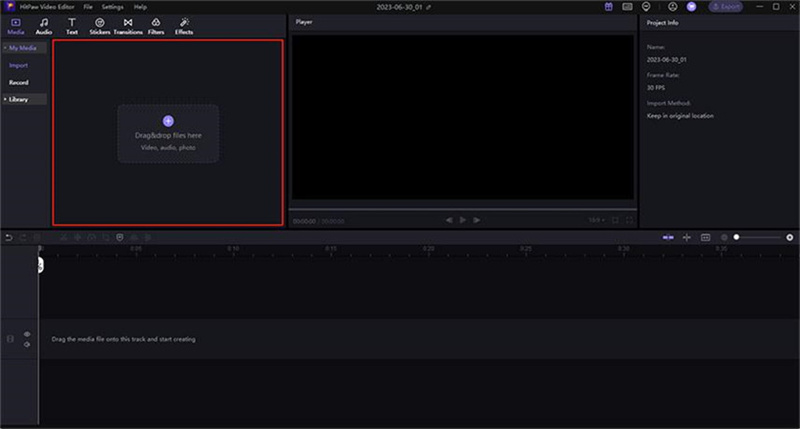
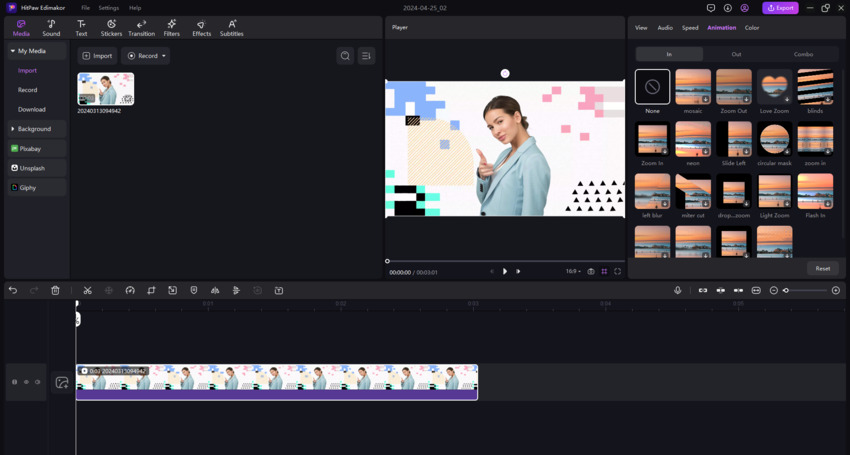
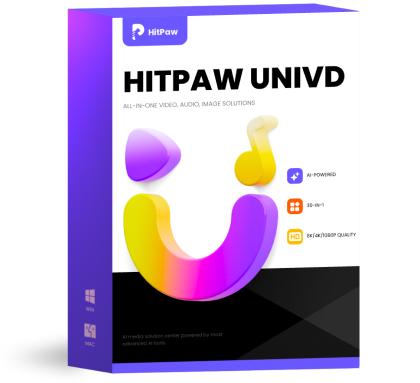

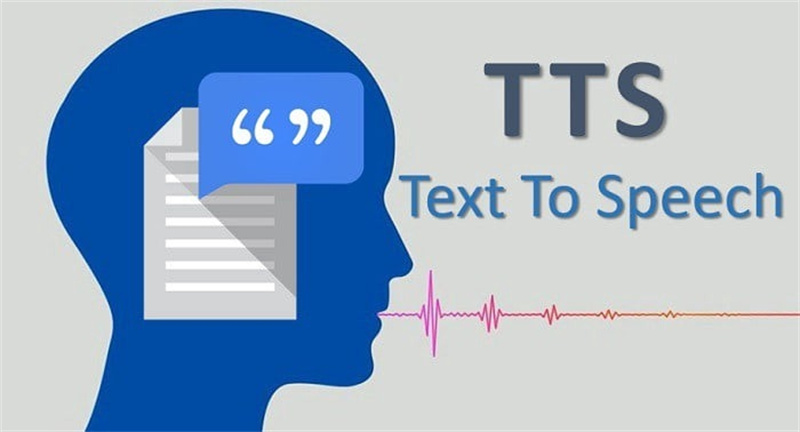



Home > AI Video Tips > Find Out What Is The Most Popular Voice Synthesizer
Select the product rating:
Joshua Hill
Editor-in-Chief
I have been working as a freelancer for more than five years. It always impresses me when I find new things and the latest knowledge. I think life is boundless but I know no bounds.
View all ArticlesLeave a Comment
Create your review for HitPaw articles